Chris Baty's Blog, page 183
August 27, 2014
Wrimos Around the World: Of Mountain Views, Historic Brothels, and Research
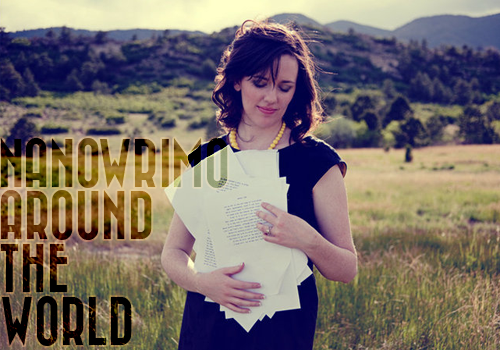
One of the best parts of NaNoWriMo? The incredible community of writers. Today, we spotlight Lindsay Lackey, who tackled historical fiction for the very first time:
I write from Colorado Springs, CO—the land of fast-food chains, road construction, and glorious, glorious mountains. It’s not ideal for foodies, maybe, but it’s a great place to live. I’ve seen a lot of growth in the city’s focus on celebrating the arts and on embracing our natural resources like mountains, trails, and open space. Plus, we have Pikes Peak Writers, which is an awesome group to be involved with!
Where would someone most likely find you writing from?
I write in all sorts of places. Lately I’ve been on a coffee shop fix, probably because it’s summer and the coffee shop near my house is part of an outdoor mall, which makes for fantastic people-watching…
I also love writing in the library. A brand new, state-of-the-art library opened in town this summer, and it has some fabulous nooks and crannies. Plus, you just can’t escape the sweeping view of the mountain range. One side of its huge upper level is almost all windows, and the view is one of the best in town. I go there when I need inspiration on setting, or just need to soak up some beauty for a while. It’s great.
What did you write for July ’ s Camp NaNoWriMo?
I broke away from my usual genre (YA fiction) to work on a story that has been rolling around in my head since I was in college. It’s inspired by my great-great grandmother, who lived a tragic and short life as a prostitute in Louisville, KY, at the turn of the century. I’ve always been fascinated by her. The only picture I’ve ever seen of her (probably the only one in existence) is of her with an arm slung affectionately over the shoulder of another woman. Both women have small, coy smiles on their faces.
Who is the other woman? What is their relationship? Why was this picture taken? I’ve never been able to get that image out of my head.
So I began researching brothels in the 1900s in the hope that my tiny seed of an idea may take root in some interesting historical twist. Boy, oh boy, did I strike gold! I discovered Karen Abbott’s compulsively-readable book, Sin in the Second City: Madams, Ministers, Playboys, and the Battle for America’s Soul, about Minna and Ada Everleigh, the brilliant sisters who built and ran the world’s most luxurious and opulent brothel, the Everleigh Club, in Chicago’s Levee District at the turn of the century.
These women came from almost nothing, and died as millionaire little old ladies. They were trying to redefine the prostitution industry, and happened to redefine business in general along the way. They were smart, sassy, savvy, and took very good care of their girls. I absolutely fell in love with them, and knew I wanted to use their example to empower my characters.
Now, I’m certainly not trying to glamorize the sex industry. But historically speaking, women had very few options back then, and prostitution really was rock bottom for a lot of them. Not so for the Everleigh sisters. I loved that Minna and Ada refused to be victims. They took the incredibly difficult circumstances of their lives and time, and transformed their situation and the lives of hundreds of young women. I simply had to see what would happen to the characters inspired by my great-great grandmother and her mystery companion by introducing them to the Everleigh sisters.
What three things do you need to get into the writing zone?
First of all, I need my brain to be full of the words of others. Reading is what inspires me to write, and I have to read authors I admire to keep me going. For this particular book, I’ve been reading writers who are masters of gorgeous prose, like Sue Monk Kidd, and who present truly strong, complex, and fascinating female characters. (Madeleine L’Engle does this beautifully.)
Secondly, I need to be somewhere outside of my house. I’m just waaaay too tempted to watch Doctor Who instead of write when I’m at home.
Third, I need music with lyrics in a foreign language. I’m a singer, so if I know the words to a song, the song takes over in my brain and I can’t write. Because of this, I listen to a lot of relatively unknown artists (in America, at least) like Dulce Pontes. And opera. I seriously can’t get enough opera.
If you could share one writing tip, what would it be?
Do more research!
I have so, so many notes in my manuscript like, “Would they have had electricity? Did people scramble eggs back then? Were girls allowed to work at Churchill Downs? How much was a train ticket from Louisville to Chicago?”
I usually write contemporary or futuristic YA (who doesn’t?!), so I just wasn’t prepared for the type of information I found myself needing. I can make changes in the next draft, of course, but it would have been handy to know some general things first!
You can find Lindsay on Twitter, and online at www.LindsayLackey.com.
Photo by Lindsay Lackey and Cedar House Photography.
August 25, 2014
At 3354 Adeline: This Isn't Goodbye

Wendy Ung did many things during her time as a NaNoWriMo intern: she was a grammar wrangler, a YouTube star-in-the-making, and an all-around gem. We’re crushed to say goodbye:
Like they say, all good things must come to an end.
This is the end of my internship at NaNoWriMo.
I’m actually at a loss of what I should say. I blame it on a mixture of disbelief and sadness. How do I even begin to say goodbye to the everyone and everything at NaNo HQ? I am incredibly grateful to the awesome staff for taking a chance on me and letting me experience the underbelly of a nonprofit. Working here honed necessary skills and taught me life lessons that will help me in all my future endeavors.
I introduced myself with a bullet point list, and I shall include it in my last post here. (It comes full circle.) What I will miss most about working at NaNoWriMo:
Hearing the laughter echo in NaNo HQ. I may not know the reason behind the laughter, but I’m weirdly comforted by the sound.
Getting treated to tacos. I know I can get more tacos even when I’m not at this internship, but tacos! Never enough tacos.
Live-streaming! I had initially been extremely apprehensive about it, but as I continued to host Virtual Write-Ins with my fellow intern pal, Katharine, I began to look forward to every Wednesday where I was waving my arms around, pumping my fists, giving everybody thumbs up for getting their word count up, and dancing weirdly. Now, I just have an itch to livestream. It’s like I’m going through withdrawal.
Getting in touch with authors, educators, and NaNoWriMo participants for interviews. I love hearing from them and their excitement. Every time I get a response, I internally shriek in joy.
Posting on the blog. It may be repetitive, but I enjoy doing it. Just sitting down, and gathering images and interview responses. It’s relaxing.
Hearing all the food places that everybody on staff rave about. I am a hermit, so I don’t venture out to new places (because it’s kind of scary not knowing what to order and I’m incredibly indecisive), but thanks to the staff, I have a list of places I must pig out at.
Interacting with the NaNo community. I can feel your enthusiasm every time I talk to you. You guys are awesome!
Leaving NaNo HQ for the day, bidding everybody a “goodbye” and “see you tomorrow/next week” in a sing-song voice.
And many more that I can’t remember. If I try to think of all the awesome things that I will miss, this goodbye post will never end. (Maybe that’s a good thing?)
I’m unsure of what adventure I’ll be taking on next; it’s really scary, but no matter what, I will kick butt.
This isn’t goodbye. Who knows, you might see me in a livestream. Until then, I bid you, adieu.
— Wendy

Wendy hails from the Bay Area, where she frolics in the shade (since she and the sun are not really friends right now). She graduated from Mills College with a degree in Creative Writing. She spends most of her days huddled in a book fort, scribbling ideas for her work-in-progress stories and praising the many YA books she reads. She will emit a dinosaur noise from the back of her throat when she gets excited about books and anything pop culture.
Top photo by Flickr user 6SN7.
August 22, 2014
At 3354 Adeline: Lauren, on Returning to NaNoWriMo & Risky, Rewarding Decisions
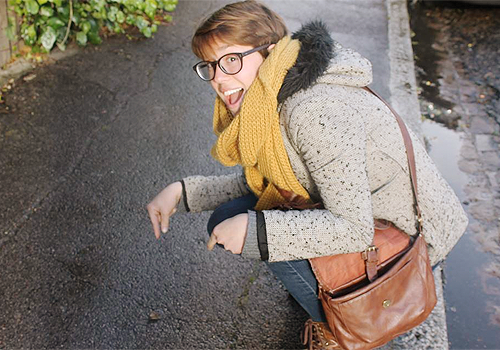
Lauren Harsma was one of our amazing interns in 2013, and has now returned as staff, with the distinguished title of Communications Captain. This means she navigates our rather talk-y ships. (Also, she talks to people.) Read on for a reintroduction:
mi•rac•u•lous (/məˈrakyələs/), adjective: rife with miracles, patently unlikely, made possible by sheer luck.
As you may remember from my introductory blog post oh-so-long-ago, I have a penchant for making terrible decisions, and those bad decisions have a tendency to transmogrify into brilliant experiences with few palpable consequences. Either I was born under a spectacular alignment of planets, or I’m just really good at disaster aversion.
I don’t accept my fruitful life in ignorant bliss—I gather nuggets of experience and add them to my basket of worldview wisdom, which is starting to splinter and fray a bit around the edges from overuse. In the past eight months I quit my comfortable job to backpack across Europe, to brood in Dutch cafés and hunt snails on London sidewalks and speak impressively-pruned German (because who needs tenses or noun gender or basic vocabulary?). I’ve read 42 books and half-written three others. I’ve done some babysitting, some dog-sitting, some house-sitting, and lots of regular sitting. I’ve fallen in new love with unagi and in old love with my hometown in upstate New York.
Oh, and I’ve returned to work at National Novel Writing Month…
Who gave me these loaded dice? These subtly notched playing cards? Who replaced that parking ticket on my windshield with a winning lottery slip? In stories people sacrifice limbs and firstborns for this kind of luck. I lost my rabbit’s foot years ago at summer camp; I’ve never found a four-leaf clover; I open umbrellas in my foyer and in the passenger seat of people’s cars.
Whatever the reason for this providence and positivity, I’m bemusedly grateful, and thrilled to once again be working at NaNo HQ, this time with the fancy-pants title of Communications Captain. As noveling season approaches I’ll be working hard planning events, writing emails, making spreadsheets, walking Blobby, and bottling good luck to distribute to every Wrimo this November as you write your novels.
(Really, take some – I don’t want to be a good-fortune-hog.)
Writing, like life, takes a bit of luck, a bit of timing, and a bit of risk. Don’t be afraid to make decisions that seem bad or scary or weird! Write what doesn’t work or make sense! Write heedlessly, write without a net to catch you! What’s the worst that could happen in this boring, real, daunting, outrageous, unreasonable world of ours?
August 20, 2014
Wrimos Around The World: Of Travels, Super Soldiers, and Being Critical
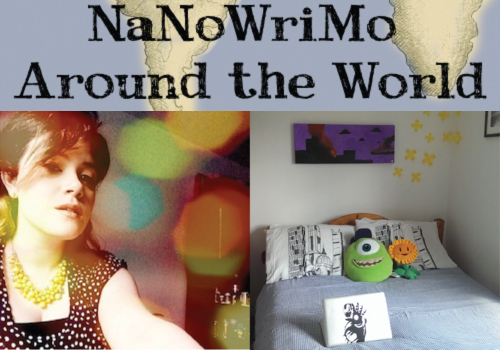
One of the best parts of NaNoWriMo? The incredible community of writers. Today, we spotlight Jillian Boorman, a wanderer who settled in Kent, England :
I have moved around quite a bit. I’m originally from Birmingham, Alabama, but from there I moved to Japan. Afterwards, I lived with my family in New Orleans, right in the heart of the French Quarter, then lived in Dublin, Ireland for a short stint, and now I currently live in my husband’s hometown of Whitstable, Kent, England. It’s a quaint but absolutely darling seaside town famous for its oysters (we even have an Oyster Festival that the Royal Family likes to attend during summer).
It’s right outside of Canterbury, famous for the Canterbury Cathedral, which is an absolutely stunning sight and if it didn’t cost so much money to enter, that is where I would choose to write.
I absolutely love to travel, and explore new cultures, languages, and food, so my husband and I have settled here so we can explore Europe and everything it has to offer without paying ridiculously expensive airfare!
Where would someone most likely find you writing from?
Oh I’m so boring! I always write in my bedroom on my bed. I have since I was a little girl when all I had was plain notebook paper and Bic pens. I suppose I feel a sense of comfort and security writing in my room, whereas in a public space I would constantly feel like someone might glance at what I’m writing and judge me. Plus my laptop does not have the battery capabilities to be away from an outlet for a long period of time!
It’s probably also because I write solely at night and everywhere else is closed. I love to write with my husband asleep beside me, and I can’t forget my adorable kitty, Hobo.
What did you write for July’s Camp NaNoWriMo?
I started a Young Adult Sci-Fi slightly dystopian-esque novel about kids with super powers. It’s an idea I had on my mind for a long time. I have a degree in International Studies, and I studied a lot about nuclear proliferation, although I chose a different topic for my thesis, I wondered what if nuclear weapons hadn’t been used and instead they tried to find alternative routes to fight wars; and of course I landed on the cliché, but fun, super soldier idea. It really sparked something within me because for many years I’ve struggled getting even 25k written in a month, but I managed 60k in July… it’s mind-blowing.
Most people like to drink coffee or tea when they write. What is your drink preference?
I love tea and I love coffee. Both with lots of sugar, no milk because I’m lactose intolerant. I just double triple the sugar. If I had to choose, it would be black tea, three sugars, all the time. Fill it up half-way with boiling water the rest of the way with cold water so it’s ready to drink right away.
If you can go back in time to give yourself a writing tip about this past Camp, what would it be?
Stop critiquing yourself!
Everyone knows you’re your own worst critic, and with events like NaNoWriMo, your critic comes out with a megaphone. I have always been very hard on myself, and I feel that with writing, you need to learn to stop criticising yourself and just let everything go. Nothing you write is going to be perfect, nothing anyone has ever written was considered perfect by everyone, especially not the author, and especially not the first draft.
I have felt on many occasions that I should just give up because I can’t write. That I’m just embarrassing myself and I should stop before someone actually reads this. I spent all of July sitting around thinking, “Ugh, I can’t write. I’m awful. This is awful. No one would like this.” And you have to remind yourself that that part of you is something that everyone else writing deals with. Even the greats had/have their inner critics and sometimes you just have to tell them to sit down and shut up so you can keep writing.
Drown them out with music! Calm them down with herbal tea! Watch an episode of Bob’s Burgers before continuing. Just don’t listen to anything that little nagging voice says because its wrong. Your writing matters, your ideas matter because it’s your voice, it’s your imagination, and it’s your words. Cut those weights of negativity off and let them fly. You never know, someone far away may see those words spread across the sky and smile.
August 18, 2014
The Evolution of Fanfiction, and Creating a Writers Group
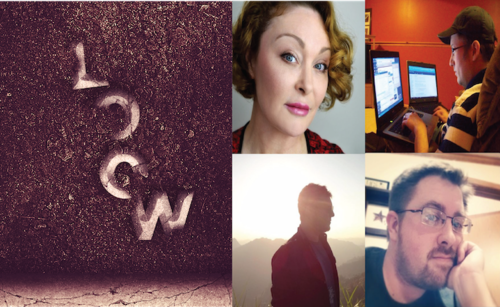
LOOW is a group of Wool series writers, who are donating the lifetime profits of their Wool Gathering anthology to NaNoWriMo! We talk with them about their anthology and how they created a successful writing group.
Has the group participated in NaNoWriMo? What have their experiences been like?
Ann Christy: I have! Twice. And both times I completed something I really like. Neither of those projects have been published yet because other projects needed to be finished, but it was my first experience with purposefully writing a full book. I had no idea I could do it until I signed up for NaNoWriMo. It changed my life.
Will Swardstrom: I had never even heard of NaNo before last summer and gave it a go last year. I successfully wrote 50,000 words in November 2013 towards my second novel, Dead Sight. It was a great experience and helped me to realize writing each and every day was essential to crafting a tight narrative. Also having the accountability was good for me.
WJ Davies: I participated in NaNoWriMo in November of 2013, and this proved to be one of the most challenging tasks I’ve taken on as a writer. Over 1,600 words a day for 30 days?!? My non-writer friends told me thought I was crazy, but you know what? At the end of the day I had written a 50,000 word book in a month. I’m extremely happy with the book, and I don’t think I would have written it for years without the encouragement of the NaNo program. Whether you’re an experienced writer, or a newbie, I would highly recommend participating this coming November. You won’t regret it!
What is LOOW? How did the group form?
Ann: LOOW stands for League of Original Woolwrights at first, however it has since grown to mean much more. Occasionally, we call ourselves the League of Ostrich Wranglers, which is fun. Most of the LOOW are early fans of the WOOL series by Hugh Howey, (before mega-stardom), and all of us have written fiction set in that universe. Now, the LOOW is comprised of a tight group of authors who are super supportive of each other. It’s a safe group where we can ask each other the scary questions, or commiserate with each other when there are stumbles and, yes, celebrate the successes as well.
What kinds of things do LOOW do as a group?
Ann: While we’ve never been able to meet up with each other in real life since many of us live on other continents, you’d never know it by the way we interact. We beta read for each other, provide art and story idea feedback and support each other’s marketing efforts. It truly is cooperative. And we know it works because we’re not even afraid to tell each other when something is bad anymore. That’s such a rare thing and so valuable.
Thomas Robins: We discuss cover design, marketing, and how we are struggling in our writing (we even delve into politics occasionally, if that’s not a sign of a strong team, I don’t know what is). We support each other and offer all kinds of free advice. We worked together on the WOOL Gathering collection and have starting working on a superhero short story collection to be released this fall (it’s looking good, too). Most of us interact online every day, we are that close.
How do you run an effective writing group?
Thomas: An effective author support team needs to be made up of people who are willing to freely share their talent and insight with each other, as well as admit any mistakes they have made. We learn from each other’s successes and failures. However, you can’t just get a group of people together and call them an effective team. There has to be some commonality, some sense of friendship among the members. For example, if swearing is somewhat offensive to you but everyone in your group cusses like a sailor, you won’t feel welcome. It takes time to get involved with a group that fits. It’s like finding a significant other, you can’t force it because you think you need it, you find it when you least expect because you are out there being yourself.
I think it’s also important to note that for a writing group to be effective, it needs to be small, ten or so people. It keeps the discussions more intimate and encourages everyone to participate. Along with that, the group should be fluid, people can leave when they feel they need to and new people are allowed in, being very picky not to upset the balance of the group. Ultimately, there is nothing to “do” to run an effective group, with the right people it runs itself.
Tell me about this anthology. Why did the group choose to write about the Silo Saga? What makes it special?
Ann: For me this was a no-brainer as a world to write in. If Hugh hadn’t given his permission and others hadn’t encouraged me, I wouldn’t even be a writer at this moment. I certainly wouldn’t be launching my fifth book (ninth publication if you include four anthologies). And since I started in the Silo world, I wanted to delve into it again for a good cause. I think for all of us, the stories inside are pretty close to our hearts. Mine is a glimpse into the earliest moments of the Silo 49 series, and it is the only place such a glimpse can be gotten at this time. That makes it special to me, for a special cause, so it’s all good.
Will: We chose the Silo Saga because that was essentially how we all got our breaks in the self-publishing business. It holds a special place in my heart. I followed Hugh Howey’s blog for a while before I decided I could do the same thing as him and write my own stories. It was his openness as an author that inspired me.
WJ: Two books really stood out to me as being exceptional, and those were The Atopia Chronicles by Matthew Mather, and WOOL by Hugh Howey. I became a huge Howey fan, and ordered many signed copies of his books, as well as devouring his entire library. When I started writing, one of the first ideas that came into my head was a story taking place in Hugh’s Silo Universe. I wrote it, mostly so I could get some writing practice under my belt, and then sent it to Hugh himself. To my great surprise he not only read “The Runner”, but also raved about it on his blog!
The book sold well right out of the gate, and gave me the much needed enthusiasm I needed to delve into writing my own, full length novel—an enthusiasm I still possess a year and a half later. The bottom line is, writing in Hugh’s world is plain FUN, and he created an environment so rich that dozens of authors have now produced Silo Stories.
The WOOL Gathering Anthology, I feel, completely epitomizes the excitement readers and writers feel when they delve into Howey’s exciting world. And that we are able to donate the proceeds to a great organization like NaNoWriMo is icing on the cake!
Why do you support the Young Writers Program?
Will: For myself, I never really had a lot of encouragement to writer when I was a teenager. In addition to being an author, I’m also a high school teacher and see kids that want to be creative. If I can help that by supporting the Young Writers Program as well, then all the better.
Ann: Because NaNoWriMo changed my entire life and how I viewed myself. Until that moment when I finished my first novel in NaNo, I was a scientist and a naval officer. That is what defined me. When I got that winner notification, I realized I was something else as well: a writer. And that is something I can keep with me for the rest of my life. How cool is that? Now…consider that I’m 47. What might that feeling be like for a young person? How might that change the entire course of their life and brighten their future? The real question is, how can anyone who hasn’t benefitted from NaNoWriMo not support the Young Writers Program?
Ann Christy is a career naval officer and secret science fiction writer. She lives by the sea under the benevolent rule of her canine overlords and a variety of unruly family members.
Her first published series, Silo 49, was set in the WOOL universe. She has stories in multiple anthologies and her newest release, Strikers, is now available at Amazon.
Thomas Robins is an indie author who writes science fiction with a focus on deep character development. Thomas is the author of the highly-reviewed series Desperate to Escape, along with several WOOL fan-fiction pieces. He is a professional during the day, an indie author at night, and a father of two wonderful children all the time. Thomas does a happy dance every time someone visits his blog and signs up for his newsletter.
Will Swardstrom is an indie author from Southern Illinois. He has written in Hugh Howey’s WOOL Universe as well as penning a number of his own books, including the first two books in the Dead Sleep Trilogy. He is always on the lookout for new ideas and stories. Will is married to his college sweetheart and has two children.
WJ Davies is the author of the colonization adventure serial novel Binary Cycle: (Disruption, Revelations, Skyward), as well as a post-apocalyptic, Wool-inspired trilogy of novellas, Silo Submerged: (The Runner, The Diver, The Watcher). He currently lives in Toronto and works for a computer software company. He writes in his spare time and on weekends. It’s a glamorous life. You can find him on Twitter and Facebook.
August 15, 2014
Young Writer Chronicles: Something Magical...
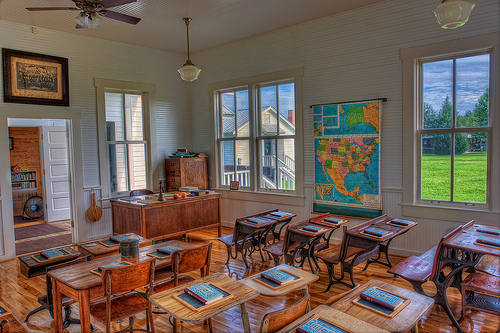
Tomorrow’s stories start in all sorts of places: on the drive to work, or at the movie theater. One constant source of inspiration? The classrooms that tackle NaNoWriMo through our Young Writers Program. YWP educator Daniel Stone shares about the magical experience of writing a novel in the classroom:
What made you want to use the Young Writers Program at your school?
I did NaNoWriMo myself in 2009 and it was a great experience. Then, I learned about the Young Writers Program, which sounded very scary but I figured it was worth a try. That was in 2011. It was such a big success with the students, the parents, and everyone around the school that I’ve done it three years in a row and am planning on continuing to do it in the future.
Were there any obstacles to running the Young Writers Program?
It’s not easy! When the students and parents first learn about it, they are reluctant, which is an obstacle. This year I was at a new school, so my co-workers’ and students’ unfamiliarity with the program was a bit of an obstacle. There are a lot of holidays and off-days in November, which cuts down on time that students can work on their novels in class, and guidance that I can give them.
Also, in October I became a father for the first time, which drastically cut down on the amount of free time that I had for planning and working on this project! But the positives of the program are so strong that they easily overcome any obstacles that I may run into.
What surprised you about the program?
Even though this was the third year that I have participated in this program, it always surprises me to see the amount of work that middle school students are willing to put into a writing project. I hosted a few after-school Write-In’s where I had 30 or more students decide to spend a couple of hours after school working on their stories.
Students excitedly share pieces of their stories with each other, ask their friends for advice on where to take their stories next, and there is an incredible energy in the classroom that is all about writing and creativity. It’s an amazing thing to experience.
What was your favorite moment of running the YWP last year?
There are so many stories and students and achievements that I could go on and on about, it’s hard to pick one! But the ones that always stand out to me are the ones that involve students who come to my class at the beginning of the year hating to write and strongly believing that they are unable to be successful at writing. But something “magical” happens during NaNoWriMo to change them. Maybe it’s the ability to write about any topic they want, or the way the prewriting activities break the task into manageable parts, or the final copies that they get to hold in their hands, or even the pressure from their friends who are also writing novels – but time after time, these students come to me after the process is over and give me an autographed copy of their novel with a smile on their face that shows me how proud they are to have accomplished such an amazing feat!
These students who get to experience success in a writing project for the first time in their lives and who now have an improved confidence in their own abilities for future assignments, they are the ones who make me very proud and who make me want to use the Young Writers Program in my classes every year!

Daniel Stone is an 8th grade Language Arts teacher in South Carolina. He has successfully guided a few hundred students into becoming novelists over the past three years, as well as having written three Nano-novels himself. When he’s not teaching or writing, he likes to watch movies, try new and interesting food, and relax by listening to music. But most of his time lately has been spent with his wife, Christine, chasing after their 8-month-old son, Jacob.
Photo by Flickr user Photomatt28.
August 13, 2014
I Published My NaNo Novel: Mary Potter Kenyon on Researching Nonfiction & Building a Platform
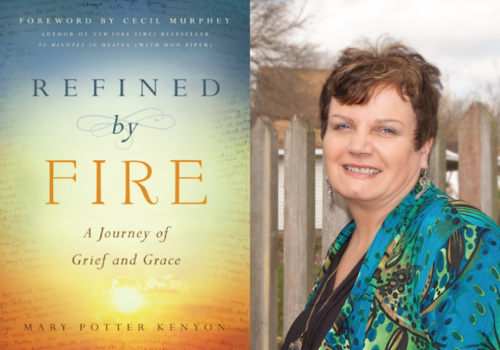
Mary Potter Kenyon has been a participant of NaNoWriMo since 2011. She wrote and revised Coupon Crazy: The Science, the Savings, and the Stories Behind America’s Extreme Obsession during two Novembers:
What was your experience like when you participated in NaNoWriMo?
The first year I participated was November 2011. I was teaching a writing class for a group of young homeschooled girls and had each of them sign up on NaNoWriMo’s Young Writers Program site. I figured if I was giving them the challenge of writing a book in the month of November, I should be willing to challenge myself to do the same thing.
I was working on a non-fiction book at the time so I just used NaNoWriMo as an incentive to complete my rough draft. The next year I did the same thing, actually using NaNoWriMo as an incentive to revise and polish those same pages. I wouldn’t recommend it for revision, however, because the whole goal is to crank out a lot of words in one month, and the revision can come later. But I’d just signed a book contract in 2012 and needed to turn in a polished manuscript.
I set up a NaNoWriMo support group in 2012, and even though there were only three of us, we met at the library once a week to write. The support system was fantastic, and I’d love to do that again.
What do you like about writing nonfiction? How do you approach a nonfiction project?
Maybe I’m just a natural know-it-all. I love random facts and statistics. My background is in Psychology, and I am always wondering about the why behind everything. I also love to do research, delving into topics I am passionate about. Writing non-fiction gives me that opportunity. I also like the idea that my words and experiences might be able to help other others. I’ve had newspaper jobs where I had to write on assigned topics or report on something I am not the least bit interested in. That kind of writing is very difficult for me.
I keep a file of articles I’ve torn out of magazines; topics that interest me; I also have several book ideas, with files for each one of those. When I see an article online related to a topic I am interested in, I e-mail the article to myself. So the idea comes first. I like to work from an outline, so I try to get a rough outline completed fairly early on for long projects like a book. Writing a book proposal is a wonderful way to really hone in on your topic. Not only do you have to work out an outline and have a sense of where your book is going, but it makes you take a good hard look at what is already out there in the publishing world.
You wrote a book about America’s obsession with coupons. What fascinates you about this subject? What inspires you to keep writing about it?
I’d written a lot of articles about how to save money with coupons, but no one had delved into the “why” behind it. Out of the ten children from the same family, why was I the one to get obsessed with couponing? What was it about the idea of “free stuff” that made me think it was a good idea as a mother of several young children to go trekking through alleys peeling off the labels of other people’s garbage so I could order free t-shirts, stuffed animals and balls?
It was my husband’s idea for me to delve into the subject so deeply, interviewing couponers from all over the United States, researching the psychology behind it, and chronicling my own story of a life obsessed by free stuff and coupons. When he saw an article on the front page of the Wall Street Journal calling couponing the newest “extreme sport,” he encouraged me to take my ideas and begin that book I’d always talked about. I didn’t just study the subject, I’d lived it for over 30 years.
As part of building up my platform as a non-fiction writer, I started teaching couponing classes at area community colleges and libraries. A newspaper approached me and asked if I would write a weekly column on couponing. I’ve been writing that column for nearly three years. Unfortunately, the man who encouraged my writing did not live to see it published. My husband died in March 2012. I signed the book contract several months later.
What types of workshops do you usually teach? What do you find helpful in teaching them?
I have been teaching writing workshops for three years. The first one I taught was that class for young homeschoolers. I had so much fun, I wanted to do the same thing with adults. I love encouraging fledgling writers. I get almost as excited to see one of my students in print as I do seeing my own work published!
It was easy to design a basic writing course for beginning writers. I’d made all the mistakes I could teach others not to make! I’d been published in magazines, anthologies and newspapers and my first book was published in 1996. I’d learned the ins and outs of the publishing world, knew what it was to have acquired an agent, and had done my research in how to write query letters, a synopsis and a book proposal.
This November I will be conducting workshops at the Dubuque, Iowa library in conjunction with NaNoWriMo, encouraging writers who are participating in NaNoWriMo to begin submitting some of their work and teaching them how to write queries and proposals.
For writers who don’t usually write non-fiction but are interested in it, what advice would you give them on how they can get started?
I have a lot of students who want to write a book or who are working on a book, and that is wonderful. But as I point out in my workshops, agents and publishers like to see that you have established yourself as a writer in some way, through published “clips,” and by building up a platform. I encourage writers to work on smaller pieces to get some of those clips, to blog, and to attend writer’s conferences where they can learn from other writers and establish contacts in the publishing world. One place to find calls for submission is in Hope Clark’s FundsforWriters newsletter.
It takes time to hone our craft and persistence too. Sometimes it is all about finding the right “fit” for our work. I had a book manuscript sitting in a file cabinet drawer for nearly five years before I sold it. Chemo-Therapist: How Cancer Cured a Marriage was released in April. The funny thing is, I had to do a great deal of revising of that completed manuscript. It turned out I had become a much better writer in the ensuing five years since I’d pitched it to 88 agents and publishers. (Yes, I am stubborn.)
Mary Potter Kenyon graduated from U.N.I. with a B.A. in Psychology. Director of the Winthrop Public Library, she is widely published in magazines, newspapers and anthologies. Her essay, “A Mother’s Masterpiece” appeared in the January/February 2013 issue of Poets & Writers magazine. Mary writes a weekly couponing column for the Dubuque Telegraph Herald and conducts writing workshops for community colleges, libraries, and bookstores. Her book, Refined By Fire: A Journey of Grief and Grace, with a foreword by New York Times bestselling author, Cecil Murphey,will debut in October.
I Published My NaNo Novel! Mary Potter Kenyon on Researching Nonfiction & Building a Platform

Mary Potter Kenyon has been a participant of NaNoWriMo since 2011. She wrote and revised Coupon Crazy: The Science, the Savings, and the Stories Behind America’s Extreme Obsession during two Novembers:
What was your experience like when you participated in NaNoWriMo?
The first year I participated was November 2011. I was teaching a writing class for a group of young homeschooled girls and had each of them sign up on NaNoWriMo’s Young Writers Program site. I figured if I was giving them the challenge of writing a book in the month of November, I should be willing to challenge myself to do the same thing.
I was working on a non-fiction book at the time so I just used NaNoWriMo as an incentive to complete my rough draft. The next year I did the same thing, actually using NaNoWriMo as an incentive to revise and polish those same pages. I wouldn’t recommend it for revision, however, because the whole goal is to crank out a lot of words in one month, and the revision can come later. But I’d just signed a book contract in 2012 and needed to turn in a polished manuscript.
I set up a NaNoWriMo support group in 2012, and even though there were only three of us, we met at the library once a week to write. The support system was fantastic, and I’d love to do that again.
What do you like about writing nonfiction? How do you approach a nonfiction project?
Maybe I’m just a natural know-it-all. I love random facts and statistics. My background is in Psychology, and I am always wondering about the why behind everything. I also love to do research, delving into topics I am passionate about. Writing non-fiction gives me that opportunity. I also like the idea that my words and experiences might be able to help other others. I’ve had newspaper jobs where I had to write on assigned topics or report on something I am not the least bit interested in. That kind of writing is very difficult for me.
I keep a file of articles I’ve torn out of magazines; topics that interest me; I also have several book ideas, with files for each one of those. When I see an article online related to a topic I am interested in, I e-mail the article to myself. So the idea comes first. I like to work from an outline, so I try to get a rough outline completed fairly early on for long projects like a book. Writing a book proposal is a wonderful way to really hone in on your topic. Not only do you have to work out an outline and have a sense of where your book is going, but it makes you take a good hard look at what is already out there in the publishing world.
You wrote a book about America’s obsession with coupons. What fascinates you about this subject? What inspires you to keep writing about it?
I’d written a lot of articles about how to save money with coupons, but no one had delved into the “why” behind it. Out of the ten children from the same family, why was I the one to get obsessed with couponing? What was it about the idea of “free stuff” that made me think it was a good idea as a mother of several young children to go trekking through alleys peeling off the labels of other people’s garbage so I could order free t-shirts, stuffed animals and balls?
It was my husband’s idea for me to delve into the subject so deeply, interviewing couponers from all over the United States, researching the psychology behind it, and chronicling my own story of a life obsessed by free stuff and coupons. When he saw an article on the front page of the Wall Street Journal calling couponing the newest “extreme sport,” he encouraged me to take my ideas and begin that book I’d always talked about. I didn’t just study the subject, I’d lived it for over 30 years.
As part of building up my platform as a non-fiction writer, I started teaching couponing classes at area community colleges and libraries. A newspaper approached me and asked if I would write a weekly column on couponing. I’ve been writing that column for nearly three years. Unfortunately, the man who encouraged my writing did not live to see it published. My husband died in March 2012. I signed the book contract several months later.
What types of workshops do you usually teach? What do you find helpful in teaching them?
I have been teaching writing workshops for three years. The first one I taught was that class for young homeschoolers. I had so much fun, I wanted to do the same thing with adults. I love encouraging fledgling writers. I get almost as excited to see one of my students in print as I do seeing my own work published!
It was easy to design a basic writing course for beginning writers. I’d made all the mistakes I could teach others not to make! I’d been published in magazines, anthologies and newspapers and my first book was published in 1996. I’d learned the ins and outs of the publishing world, knew what it was to have acquired an agent, and had done my research in how to write query letters, a synopsis and a book proposal.
This November I will be conducting workshops at the Dubuque, Iowa library in conjunction with NaNoWriMo, encouraging writers who are participating in NaNoWriMo to begin submitting some of their work and teaching them how to write queries and proposals.
For writers who don’t usually write non-fiction but are interested in it, what advice would you give them on how they can get started?
I have a lot of students who want to write a book or who are working on a book, and that is wonderful. But as I point out in my workshops, agents and publishers like to see that you have established yourself as a writer in some way, through published “clips,” and by building up a platform. I encourage writers to work on smaller pieces to get some of those clips, to blog, and to attend writer’s conferences where they can learn from other writers and establish contacts in the publishing world. One place to find calls for submission is in Hope Clark’s FundsforWriters newsletter.
It takes time to hone our craft and persistence too. Sometimes it is all about finding the right “fit” for our work. I had a book manuscript sitting in a file cabinet drawer for nearly five years before I sold it. Chemo-Therapist: How Cancer Cured a Marriage was released in April. The funny thing is, I had to do a great deal of revising of that completed manuscript. It turned out I had become a much better writer in the ensuing five years since I’d pitched it to 88 agents and publishers. (Yes, I am stubborn.)
Mary Potter Kenyon graduated from U.N.I. with a B.A. in Psychology. Director of the Winthrop Public Library, she is widely published in magazines, newspapers and anthologies. Her essay, “A Mother’s Masterpiece” appeared in the January/February 2013 issue of Poets & Writers magazine. Mary writes a weekly couponing column for the Dubuque Telegraph Herald and conducts writing workshops for community colleges, libraries, and bookstores. Her book, Refined By Fire: A Journey of Grief and Grace, with a foreword by New York Times bestselling author, Cecil Murphey,will debut in October.
August 11, 2014
NaNoWriMo at LeakyCon 2014: Celebrating Your True Self's Voice
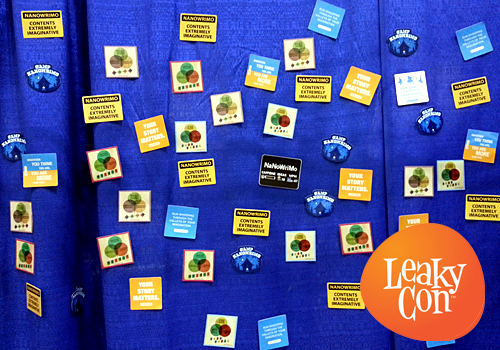
Unfamiliar with LeakyCon? Named for the Leaky Cauldron in Harry Potter, it is a fan convention that was initially created to celebrate all things Potter. Now five-years-old, it has expanded to include a multitude of fandoms: Doctor Who, Marvel and DC comics, superheroes, Downton Abbey, Supernatural—you get the picture. (The big announcement at the closing ceremonies: LeakyCon would go forward as a Harry Potter-only event, and GeekyCon would be launched as a new multi-fandom con!)
Why was I there? Well, as the volunteer Municipal Liaison for NaNoWriMo in Vero Beach, Florida, I was asked to represent NaNoWriMo. After all, LeakyCon is a place where the coolest thing you can be is yourself—and what better way to celebrate that than to tell the stories inside you? NaNo had a booth on Charity Row in The Marketplace, and there were plenty of our stickers to be had. (I used photo corners to stick them to the backdrop—the blue made the stickers pop!)
I talked to Wrimos who stopped by, and chatted about what we get from doing something as crazy as writing—or trying to write—50,000 words in 30 days. For me, it’s the opportunity to have a deadline on a new creative project. For some, it was to see if they could do it. Everyone has a story, and their story matters, whether it’s their personal story or a story they want to write.
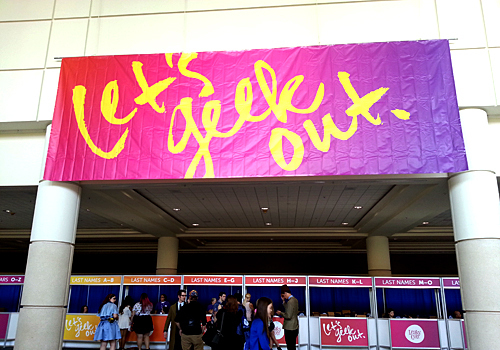
LeakyCon also gave fans the chance to listen to and get autographs from a variety of actors who were in the Harry Potter movies, and authors of their favorite books. A number of YA authors were there, including Gayle Forman, Stephanie Perkins, John Green, Lev Grossman, Rainbow Rowell, and Laurie Halse Anderson.
Many of the above authors have written pep talks for NaNoWriMo, and several authors noted they use it as a tool to get a rough draft down. NaNo was mentioned in several of the panels I attended.
More than just a fan con, LeakyCon is an opportunity to have fun. It was refreshing and creatively invigorating to be surrounded by so many people wearing costumes and passionately involved in their particular fandom/s, and passionate about being their truest selves… on the page and off.
Registration for GeekyCon 2015 (Orlando, 7/30 - 8/2) is open now.
Check out LeakyCon 2015 details on the site!
Linda Hengerer has lived in Vero Beach, Florida since 1996. A former member of Romance Writers of America and Sisters in Crime, Linda is a current member of Mystery Writers of America - Florida Chapter. She has co-chaired SleuthFest, MWA-FL Chapter’s annual writers conference, from 2009-2012, and is co-chair of SleuthFest 2014. She is working on a mystery series set in an area suspiciously like Vero Beach. She writes about football, food, and fiction.
August 8, 2014
Come Write In Anywhere! Rebecca, Alexandra, and Alex on Award-Winning Writing Groups
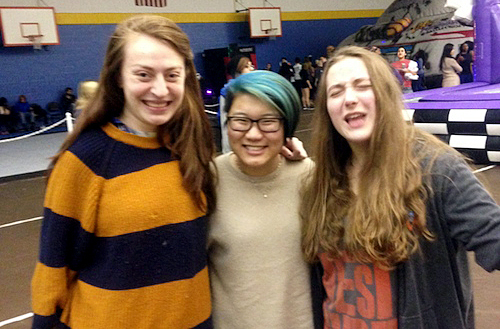
In November 2013, our Come Write In program—which provides free posters, resources, and support to libraries, colleges, bookstores, and more—helped create creative-writing beacons in 650 neighborhoods. In the CWI spirit, Rebecca, Alexandra, and Alex launched a NaNoWriMo program at the Notre Dame of Maryland University. Find out how they did it:
Getting Notre Dame of Maryland University involved in National Novel Writing Month started as a pipe dream. Organizing write-ins seemed daunting, especially for students who had barely been on campus two months. However, we thought why not give it a try anyway!
A seminar room in the English department was available to us, albeit at hours slightly too early for your typical college student. Posters went up all around campus trying to boost our attendance. Monday, Wednesday, and Friday at 8am was our selected time for write-ins. We had support and attendance from professors and staff who were far more accustomed to getting up at a decent hour…
Students were less inclined to attend than faculty and staff. November is typically the worst month of the fall semester. Finals this past fall began December 9, and Thanksgiving break was the only barricade between students and term paper due dates. November is consistently a terrible month to do any extracurricular activity. NaNoWriMo is no exception.
NaNoWriMo was a difficult task, one that we all were unable to complete. The three of us were able to make decent dents in our novels, and one administrator put us all to shame by competing in word-count competitions. Together, we grew as writers in both style and creativity. As a group, we met and socialized, sharing ideas, struggles, and questions.
NaNoWriMo, for us, was much more than a challenge, it was a way of interacting with our peers and teachers, our faculty and our friends. It was interesting to learn what each chose to focus a novel on, and the different degrees of work that went in. Some required research and others utilized perfectly subtle world-building.
We hope to strengthen the relationships we established next November, and to expand NaNoWriMo to make it more convenient for others to participate. NaNoWriMo takes a large investment of time—but that’s the challenge.
A boost to our efforts to expand NaNo on campus is our recent win at the Nancy Kreiter Undergraduate Research Day. We presented a panel on our experience doing NaNo and read excerpts from each of our works. It was incredibly successful and we were honored with the award of Best Panel. In the future, we are hoping to continue NaNo on campus and encourage others to join us.
Rebecca Corun is majoring in Classical Studies, and this was her second time participating in NaNoWriMo. She has never made it to 50k words in a month, but has made it to 50k words in a year. Baby steps.
Alexandra Mezza currently majors in Classical Studies with the hope to become an archeologist. This was her first NaNoWriMo, although she hopes to participate again next year.
Alex Filsinger is a double major in English and Communication Arts. She intends to eventually go on to law school. Alex will be participating in NaNo from Dublin City University in Ireland next year, but will be at Notre Dame of Maryland University in spirit.
Chris Baty's Blog
- Chris Baty's profile
- 63 followers



